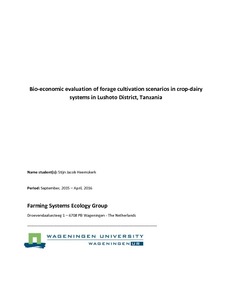Bio-economic evaluation of forage cultivation scenarios in crop-dairy systems in Lushoto District, Tanzania. Farming Systems Ecology Thesis
Lushoto District is part of Tanzania’s most important milk production regions; depending on the village, 25-95% of households own improved dairy cows. However, land pressure is high and both income and food security are low. The aim of this study has been to assess the potential of various forage cultivation intensification strategies (‘scenarios’) to improve physical production and income of smallholder crop-dairy farmers in Lushoto district, Tanzania. Representative farms were created in the FarmDESIGN model with data from household surveys, feed analyses, milk measurements, soil samples and GPS measurements from 20 farms in Ubiri village. Two baseline farms were modeled, to account for the sample range in labor availability: 4 farm households were headed by a single (grand)parent; as such, available labor was about half the level of households with at least two members active on-farm full-time. The baseline farm without such labor-constraints (‘HL’ for ‘high labor’) owns two dairy cows, the baseline farm with limited labor (‘LL’) does not own cattle. A participatory scenario development workshop revealed the most promising intensification strategy: Napier cultivation on the plots close to the homesteads. Bio-economic performance under this scenario was modeled for each representative farm, the main management difference between HL and LL being that the latter does not collect natural grasses from public land in addition to Napier cultivation. The scenario shows potential for substantial improvement compared to the baseline: a tripling of milk production, a net cash income increase of 147%, and no reduction in household food production on the representative farm without labor constraints. This scenario seems promising for both farms, but it should be noted that [1] the farms would become structurally reliant on mineral fertilizers and imported maize bran, and [2] the LL farm runs a negative carbon balance because it does not import natural grasses, thereby threatening long-term soil fertility. Results needs to be validated by future research, but they show potential for improving livelihoods of smallholder dairy farmers in Lushoto.

